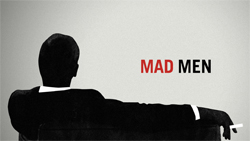
My wife and I don’t watch television in the normal sense. What we do is we pick a season of a show after it has finished airing and watch an episode every night until we’re done with the season. If we like the show, we get the next season and so on. In the case of Mad Men, after we’d finished the first season, we went right out and got seasons two to four. It’s just that good.
Choosing to give the first season a try was a no-brainer given the plethora of awards this shown has won. But it wasn’t quite the show we expected it to be. The premise is an inside view of a middleweight advertising firm set in 1960s America. As such we expected to see all manner of creative ad campaigns and the wacky people who come up with them. This show does admittedly have that. But mostly what it does is act as a sort of time capsule of what living in this period was like. And in a “so similar and yet so different” sort of way, this makes it incredibly fascinating to watch.
There are plenty of other period dramas of course. Epics like Rome and The Tudors spring to mind. But such shows are set so far back in the past that they might as well be fantasy. We know that they are historical, but we can relate to them only in a very abstract, intellectual sense. By contrast, not only is the world of Mad Men well within living memory, but the knowledge that the way things are today evolved naturally from that period gives it added poignancy. Everything is so familiar that we’ve taken for granted all the things that have since changed. Let’s look at a few examples.
The very first thing you’ll probably notice in the show is how sumptuous everything looks. That’s because Mad Men is as much a costume porn show as The Tudors was. But the very next thing you’ll notice is how much everyone smokes. I mean, seriously, the first sight of all that smoke on your tv screen is enough to send you reeling away pale-faced and coughing. And everyone smokes all the time everywhere. Lovers smoke in bed after sex (fire hazard!), doctors smoke while giving patients physical examinations, mothers blow smoke in the faces of their toddlers at the kitchen table. It’s wonder how anyone lived past the age of 40 back then. In one episode of season 2, Draper and family goes out on a picnic and leaves behind piles of trash without a second thought. Yep, this is before environmentalism too.
I also love all the casual references to the wider world of the 1960s. It’s the presidential elections and Richard Nixon has just lost against John F. Kennedy. Marilyn Monroe will be performing for the birthday celebration of JFK at Madison Square Garden. The senior partner in the advertising firm likes to name drop Ayn Rand and give favored employees copies of Atlas Shrugged. The first season ends with a moving presentation by main character Don Draper of a real-world product.
Then there’s all the casual racism and misogyny. It’s not malevolent and it’s not personal. It just is. Black elevator attendants are dressed in smart uniforms and courteously ask white office workers which floor they are heading to. The only women who work are unmarried ones and they work to snag a good husband, not to build a career. Married women are full time housewives, fully engaged in bringing up children and supporting their husbands’ careers in the correct and socially approved manner.
At the same time, even while setting all of this up, the show is busily showing us how all this slowly changing into the modern version of things that we’re all more familiar with. Health warnings about cigarettes are showing up in magazines, women are breaking stereotypes and establishing business careers of their own, television is changing the face of the advertising world and so on. It’s great to see those changes creep in because as modern viewers we know in advance what the eventual outcome of all these social changes will be.
Of course, not being Americans, all this is less relevant to us but the US does have a tendency to set trends that the rest of the world picks up on, sooner or later. So it might be worth watching even if you’re not a fan of Americana. Overall it’s a great character-driven show that I recommend for its sharp and intelligent writing. It’s not about seeing what happens next, it’s about exploring in lots of little ways the world of 1960s America.